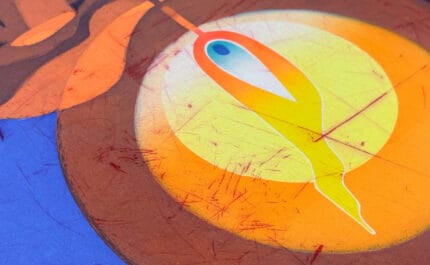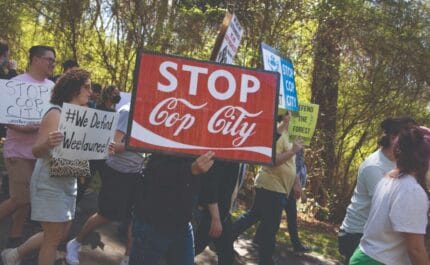The price of truth: the murder of Daphne Caruana Galizia
On 16th October Daphne Caruana Galizia was murdered by a car bomb yards from her home. In DG #29 we spoke to her friend and fellow political blogger Manuel Delia about the life and career of Malta’s most respected – and most feared – journalist

Picture courtesy of Corinne Vella
16th October 2017 (Taken from: #29)
At 2.35pm on Monday 16th October, Daphne Caruana Galizia published what would turn out to be her final blog post. A typically scathing piece on Maltese officials with alleged links to secret companies in Panama, it ended with the words: “There are crooks everywhere you look now. The situation is desperate.” Shortly after 3pm, the police were informed of an explosion a few hundred yards from Caruana Galizia’s home in the hamlet of Bidnija, 15 kilometres outside the capital Valletta. She had been murdered in a car bomb attack.
Later that day, Maltese prime minister Joseph Muscat appeared on TV to condemn the murder of the 53-year-old journalist. “Everyone knows Ms Caruana Galizia was a harsh critic of mine, both politically and personally, as she was for others too,” the Labour Party leader said. That was an understatement. On Running Commentary, the provocative blog Caruana Galizia started in 2008, words were never minced. She frequently lambasted Muscat and other public officials, calling them stupid, dishonest, hypocritical and corrupt.
Manuel Delia, a journalist and blogger who used to work for the opposition Nationalist Party, says that every Maltese person he knew who spoke English read Daphne’s blog. “In the morning you opened your emails, you opened the BBC and you opened Daphne,” he says. “She was a vital source of news and information and if you ignored her you didn’t know what was going on in Malta.”
When we heard Daphne had been killed everybody was shocked but nobody was surprised”
Delia was a teenager in the early ’90s when Caruana Galizia established her reputation as a singular voice in Maltese journalism. “Back then there were no bylines and the tone was stuffy and reverential to authority,” he recalls. “Daphne’s writing was so strong and distinctive, so critical, sharp and clear. This was a woman in her twenties completely changing the tone of journalism in Malta.”
On days when it broke huge stories, and there were many of those days, Running Commentary reportedly drew up to 400,000 readers; not bad for a blog in a country with a population of 440,000. It wasn’t uncommon for Caruana Galizia to publish more than a dozen posts a day, an eclectic mix of muckraking, caustic commentary and the kind of investigative journalism that led to international acclaim. One such scoop came in April 2017 when Caruana Galizia alleged that Leyla Aliyev, the daughter of Azerbaijan’s authoritarian leader Ilham Aliyev, had sent $1 million to a company owned by Joseph Muscat’s wife through a secret company in Panama. “The story caused a national political earthquake,” recalls Delia. “It brought about a general election ahead of schedule. But it didn’t bring about a change of government.”
Muscat, who described Caruana Galizia’s allegations as “the biggest lie ever told” in Malta’s history, won the June 2017 snap election. Shaken by the result, Delia started his own blog, Truth Be Told, and the woman he had long admired became his mentor. “Daphne taught me about style, what readers expect and the value of images,” he says.
In the months following the election Caruana Galizia upset some readers by fiercely criticising the defeated Nationalist Party, reserving particular opprobrium for its new leader, who vehemently denied her allegations of money laundering. “Those last four months of her life were particularly difficult for her,” Delia recalls. “She was aggressively attacked by the leadership of the Nationalist Party and then a new brand of trolls sent her threatening emails, very ugly things, and I think it hurt her. She was used to having Labour Party trolls out to get her and, while she wasn’t surprised that there was no difference in the breed of supporters the parties attracted, she felt very misunderstood and isolated.”

According to local media, Caruana Galizia contacted police two weeks before her murder to report death threats made against her. It’s no secret that she had enemies: her property was previously attacked and her dog killed, and at least 15 people had filed for libel against her in the first nine months of 2017 alone. “When we heard there had been a bomb in Bidnija nobody thought, ‘I wonder who the target was,’” says Delia. “When we heard Daphne had been killed, everybody was shocked but nobody was surprised. Every time she went silent for a few days, people would ask her friends if she was OK. No journalist has ever been killed in the line of duty in Malta, but Malta has never had a journalist quite like Daphne Caruana Galizia.”
Given the frequency of her blog posts, it seems extraordinary that Caruana Galizia also had a separate full-time job. She was the publisher and editor of lifestyle magazines and a devoted aesthete who filled her Pinterest page with photos of vintage furniture and oil paintings, interior design and landscaped gardens. “She loved her home and collected beautiful things,” says Delia, who explains that Caruana Galizia sought joy and pleasure in art and culture to balance the darkness and anger she found in politics. He cites a line in a speech given by Caruana Galizia’s husband, Peter, at a ceremony at the European Parliament to honour his wife in November 2017: “The more frustrated Daphne grew at the state of our country, the more beautiful our garden became.”
Caruana Galizia’s aesthetic sensibilities and her damning observations of public officials weren’t always kept separate. “She criticised taste, etiquette and protocol,” says Delia. “She would satirise the outfits of the spouses of ministers and criticise Joseph Muscat for being uncouth. In return, her critics called her haughty and snobbish.” Caruana Galizia’s unrelenting polemical writing made her an intimidating figure to many. “But in person she was quite the opposite,” says Delia. “To me she often appeared shy to the point of awkwardness.” Yet she could still make those around her nervous. “If you did something Daphne disagreed with she would not hesitate to call you out on it, however friendly you were with her,” says Manuel. “Truth-telling was an overriding consideration above all other loyalties.”
In September, Delia wrote on his blog that “the problem with Daphne Caruana Galizia is that there is only one of her”. He voiced his concern that nobody else in Malta was principled and fearless enough to “hold a mirror up to society and point out the warts”. A month later, Caruana Galizia was dead. Delia insists that he will keep using his blog to expose corruption in public life despite the clear dangers, but he hesitates to say that he can continue Caruana Galizia’s work. “She had 30 years’ experience and accumulated the confidence and trust of multiple sources, and I don’t know all these sources,” he says. “Some [of her sources] have helped me and others have clammed up because the manner of Daphne’s death suggests that someone wanted to scare them off too. I’m under no illusion that the transition will be seamless but I feel a sense of duty to continue.”
The great majority in Malta now perceive corruption as an economic benefit; they think they are better off because of it”
In December 2017, three Maltese nationals were charged with the murder of Caruana Galizia. Brothers George and Alfred Degiorgio, and Vince Muscat, all in their mid-50s, have pleaded not guilty. A further seven people were arrested in relation to the killing. With the assistance of the FBI and Dutch investigators, Maltese police concluded that the bomb was detonated by a mobile-phone text message sent by a boat off the island’s coast. Caruana Galizia’s family say that none of the ten people arrested were known to her, and she wasn’t investigating any of them at the time of her death. The family has complained about numerous aspects of the police investigation and expressed their fear that the person or people who commissioned the crime, as opposed to those who pushed the button, will never face justice.
At a candlelit vigil for the slain journalist in Valletta on the three-month anniversary of her assassination, activists wore T-shirts emblazoned with Caruana Galizia’s last written words: “Crooks are everywhere. The situation is desperate.” In a speech at the vigil, Delia encouraged attendees to keep fighting, both for Daphne and for the country’s fragile democracy. He acknowledges that it will be an uphill battle. “We are a minority in Malta,” he says. “The great majority here now perceive corruption as an economic benefit; they think they are better off because of it.”
“This was the big conversation I kept having with Daphne over those last four months,” Delia concludes. “The reason why Daphne thought the situation was desperate was not because she could see the crooks everywhere. It was because everyone could see the crooks everywhere – and most people were fine with it.”
Slow Journalism in your inbox, plus infographics, offers and more: sign up for the free DG newsletter. Sign me up
Thanks for signing up.








